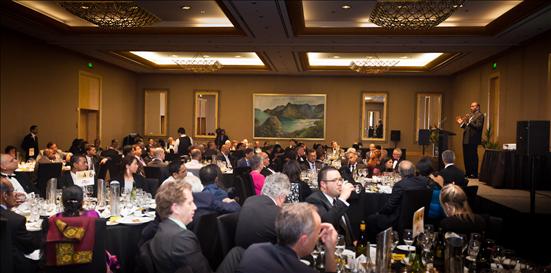The Internet is the largest ungoverned paradigm humanity has ever known.
The impact of this on our daily life will define how we understand and relate to each other, whether as individuals, corporations, governments or other forms of social communities.
Never before in history have so many people have had so much information available at their fingertips.
At the beginning of the 21st Century, there were only 350 million people connected to the Internet. Now, there are about three billion.
The number of mobile phones in use has skyrocketed from 750 million to more than six billion, predicted to rise to eight billion by 2025. In 2040, everyone over the age of 12 will have a mobile phone or device or access to one.
In one generation, we would have gone from virtually no access to unfiltered information to accessing all information in the world from a device that fits in the palm of your hand.
The velocity of information will also increase. It is expected that by 2025, our computers will be 64 times faster and eight times lighter and evolve into the size of our wristwatch. Our bandwidths will increase from 258 kps to 300 mphs, not to the node, but to your home.
Transparency transformed
We are all naked before the Internet.
This nakedness will transform our previous concepts of transparency.
The availability of information and the velocity of information will transform how we access information and increase transparency.
We are the first humans whose digital footprint will be indelible. As a result, you will have to think about how you manage everything about you that is potentially capable of being published and distorted in the Internet blogosphere, namely the tweeter.
The need for management of perception becomes almost a key necessity, whether you are a corporation, government, community organisation or an individual.
In June this year, the European Court of Justice (European Union’s highest Court), said that Google and other search engines are not responsible for personal information published and that they have no obligation to delete the data. The Court also ruled that Google could not be compelled to erase past history of an individual.
This will mean your digital record will be there for posterity. Will this change our desire to be truly transparent?
We are going into uncharted territory.
The Arab Spring
The impact of technology to enable transparency was demonstrated in the Arab Spring of 2011, during which, the Egyptian revolt arose from nowhere; no one had predicted the downfall of (President) Hosni Mubarak.
The clampdown on the Internet and mobile devices by the authorities infuriated the ordinary Egyptian. The refusal by several mobile carriers to comply with government control enabled massive mobilisation at a speed never seen before. The standoff finally set off the ouster of an unassailable Mubarak in two weeks. This must have send shivers down the spine of many other authoritarian governments and despots.
The ‘Gangnam’ style song went viral and within weeks recorded more than a billion hits, transcending borders and cultures.
This is transforming ideas of digital marketing.
Security redefined
 Julian Assange, the founder of WikiLeaks, who is cooped up in the Ecuadorian Embassy in London, had warned that his life’s mission is to expose the dark secrets which are based on duplicity and misinformation supplied to the public.
Julian Assange, the founder of WikiLeaks, who is cooped up in the Ecuadorian Embassy in London, had warned that his life’s mission is to expose the dark secrets which are based on duplicity and misinformation supplied to the public.
He said that information should be free.
The case of Edward Snowden, who was in Moscow airport after revealing secret information that the National Security Agency (NSA), was carrying out surveillance on millions of Facebook, Google, LinkedIn, Skype and telephone conversations, has been debated widely in the global media by human rights activists and security agencies.
Whether you like it or not, the new world of heightened security will redefine what is available to security services and what will be private.
Will this mean that we should not say anything on mobile phones and emails, which we are not prepared to repeat in a court of law or have flashed as a headline in the media?
US President Obama unequivocally suggests that you cannot have 100% security with 100% privacy. “They are incompatible.”
We will have difficulty in describing the world without mobile phones and the Internet to our children just as our parents and grandparents had about the telephone and television.
Children will grow faster in the virtual world without the advantage of maturity to be aware of the consequences of their actions.
You will have to talk to your children about privacy and security before you have the awkward conversation about sex. Given the fact that they will not be able to erase their digital footprint, total transparency may be dangerous.

Constant surveillance
There will be cameras everywhere, whether on satellite or on earth, able to track your every movement and cars without drivers; a black box like an aircraft will take away risks of predictions in accidents, creating new levels of transparency.
We are indeed moving into a world where we have no understanding of the social implications of such a level of transparency.
The new buzz words are ‘big data,’ which enable data mining with predictive capability.
This will mean computers will make predictions based on data analysis. Government security agencies are already using this to predict criminal behaviour, particularly in counterterrorism. Computers will create virtual transparency.
A concept called, ‘Non Observable Recognition Algorithms,’ almost replicates the human brain in pattern recognition. This will enable police and other authorities to take pre-emptive action.
Vino Ramayah is the Executive Chairman of Medtech Global Limited and many other companies with offices in New Zealand, Australia, US and India. He was the Guest Speaker at the Indian Newslink Sir Anand Satyanand Lecture held at Stamford Plaza Hotel on July 29, 2013. Other excerpts from his Lecture appear in this Section, and under Businesslink and Viewlink.






